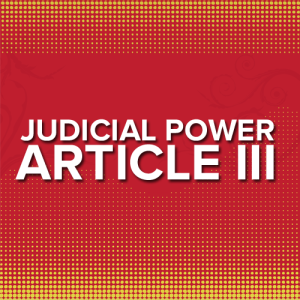Campbell-Ewald Co. v. Gomez: Class Actions and Article III

In Campbell-Ewald Co. v. Gomez, 577 U. S. ____ (2016), the U.S. Supreme Court considered whether a case becomes moot, and thus beyond the judicial power of Article III, when the plaintiff receives and rejects an offer of complete relief on his claim. By a vote of 6-3, the justices ruled that an unaccepted settlement offer or offer of judgment does not moot a plaintiff’s case. The decision in favor of consumers is a rare class-action loss for the business community.
The Facts of Campbell-Ewald Co. v. Gomez
The U.S. Navy contracted with petitioner Campbell-Ewald Company (Campbell) to develop a multimedia recruiting campaign that included the sending of text messages to young adults, but only if those individuals had “opted in” to receipt of marketing solicitations on topics that included Navy service. Campbell’s subcontractor, Mindmatics LLC, transmitted the Navy’s message to over 100,000 recipients, including respondent Jose Gomez, who alleges that he did not consent to receive text messages and was not in the Navy’s targeted age group. Gomez filed a class action lawsuit, alleging that Campbell violated the Telephone Consumer Protection Act (TCPA).
Before the deadline for Gomez to file a motion for class certification, Campbell proposed to settle Gomez’s individual claim and filed an offer of judgment pursuant to Federal Rule of Civil Procedure 68. Although Gomez did not accept, Campbell argued that its offer mooted Gomez’s individual claim by providing him with complete relief. The District Court denied the motion, but ultimately dismissed the suit on summary judgment. The court held that Campbell, as a contractor acting on the Navy’s behalf, acquired the Navy’s sovereign immunity from suit under the TCPA. The Ninth Circuit reversed. While it agreed that Gomez’s case remained live, the panel held that Campbell was not entitled to “derivative sovereign immunity.”
The Legal Background of Campbell-Ewald Co. v. Gomez
Article III of the Constitution limits the authority of the federal courts to the adjudication of “Cases” or “Controversies.” As interpreted by the Supreme Court, Article III’s “cases” and “controversies” limitation requires that “an actual controversy . . . be extant at all stages of review, not merely at the time the complaint is filed,” Arizonans for Official English v. Arizona, 520 U. S. 43, 67 (internal quotation marks omitted). However, a case does not become moot as “long as the parties have a concrete interest, however small,” in the litigation’s outcome, Chafin v. Chafin, 568 U. S. ___, ___ (internal quotation marks omitted).
The Majority Decision on Campbell-Ewald Co. v. Gomez
The majority held that an unaccepted offer does not moot a plaintiff’s claim, thereby depriving federal courts of Article III jurisdiction. Justice Ruth Bader Ginsburg wrote for the majority. As she explained: “[A]n unaccepted settlement offer has no force. Like other unaccepted contract offers, it creates no lasting right or obligation. With the offer off the table, and the defendant’s continuing denial of liability, adversity between the parties persists.”
The Court further held that Campbell’s status as a federal contractor did not entitle it to immunity from suit for its violation of the TCPA. “When a contractor violates both federal law and the Government’s explicit instructions, as alleged here, no immunity shields the contractor from suit,” Ginsburg stated.
The Dissent of Campbell-Ewald Co. v. Gomez
Chief Justice John Roberts authored dissent that was joined by Justices Samuel Alito and Antonin Scalia. The dissenters argued that the case was indeed moot. As the Chief Justice wrote:
When a plaintiff files suit seeking redress for an alleged injury, and the defendant agrees to fully redress that injury, there is no longer a case or controversy for purposes of Article III. After all, if the defendant is willing to remedy the plaintiff’s injury without forcing him to litigate, the plaintiff cannot demonstrate an injury in need of redress by the court, and the defendant’s interests are not adverse to the plaintiff.
Previous Articles
SCOTUS Decision in Bowe v. United States Is First of the 2026 Term
by DONALD SCARINCI on February 5, 2026
In Bowe v. United States, 607 U.S. ___ (2026), the U.S. Supreme Court held that Title 28 U.S.C. § ...
SCOTUS Rules State Can’t Immunize Parties from Federal Civil Liability
by DONALD SCARINCI on January 29, 2026
In John Doe v. Dynamic Physical Therapy, LLC, 607 U.S. ____ (2025) the U.S. Supreme Court held that...
Supreme Court to Address Racial Discrimination in Jury Selection
by DONALD SCARINCI onWhile the U.S. Supreme Court has concluded oral arguments for the year, it continues to add cases t...
The Amendments
-
Amendment1
- Establishment ClauseFree Exercise Clause
- Freedom of Speech
- Freedoms of Press
- Freedom of Assembly, and Petitition
-
Amendment2
- The Right to Bear Arms
-
Amendment4
- Unreasonable Searches and Seizures
-
Amendment5
- Due Process
- Eminent Domain
- Rights of Criminal Defendants
Preamble to the Bill of Rights
Congress of the United States begun and held at the City of New-York, on Wednesday the fourth of March, one thousand seven hundred and eighty nine.
THE Conventions of a number of the States, having at the time of their adopting the Constitution, expressed a desire, in order to prevent misconstruction or abuse of its powers, that further declaratory and restrictive clauses should be added: And as extending the ground of public confidence in the Government, will best ensure the beneficent ends of its institution.





